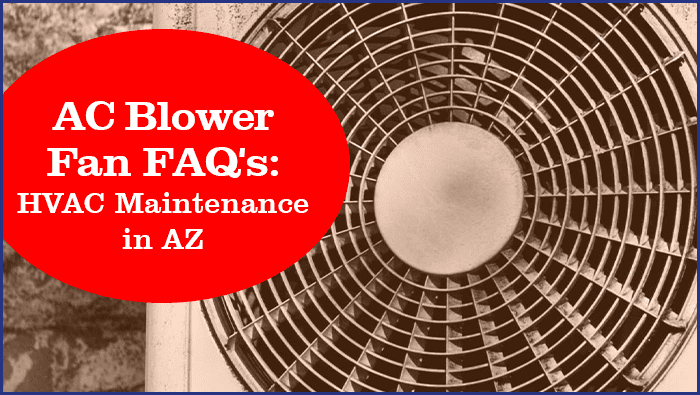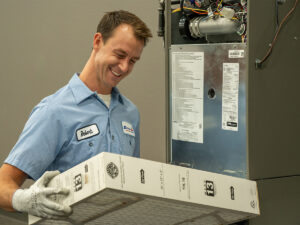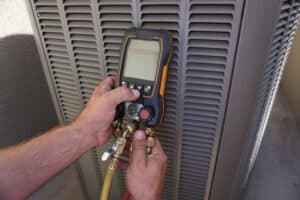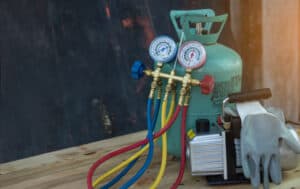Experiencing an HVAC malfunction in the middle of the brutal Arizona summer months can certainly be a hassle.
Unfortunately, diagnosing both common and subtle HVAC issues can be challenging.
If you’re a homeowner that lacks the time and expertise in troubleshooting your HVAC system, then you may find it frustrating to find out why your AC blower fan is not working.
In particular, the AC fan blower motor circulates cool air throughout your home.
When this home AC blower fan stops working, your unit will simply stop blowing cold air.
This means that your monthly utility bills will spike, although your AC unit is running at maximum capacity.
Understanding this issue can help you prevent the expensive consequences of a blower fan failure.
You can also contact an HVAC technician more conveniently if you know how to diagnose the issue.
Here are some frequently asked questions (FAQs) regarding AC blower issues.
What Is a Sign That the AC Blower Fan Is Going Out?
Without noticing, the AC fan blower motor can stop working at any time.
Many homeowners lack the technical expertise of diagnosing this problem before it’s too late.
The good news is that recognizing when the blower fan is malfunctioning is quite simple.
The first indication is noticing a small draft from your air vents.
If this is happening, your AC unit is working too hard to circulate cool air throughout your home.
If a dirty filter is not the culprit, then you can blame a bad capacitor in the blower fan for the issue.
Other signs that point to a blower fan problem include:
- No airflow coming from the vents.
- Unusually expensive utility bills.
- Strange signs coming from the AC unit.
If you are noticing these signs, then you need to contact an HVAC technician immediately for repair.
Can You Repair the Blower Fan on Your Own?
It’s not recommended to make any repairs on your unit’s blower fan on your own. Granted, many homeowners can easily troubleshoot errors, such as a tripped circuit breaker.
More often than not, you should avoid repairing your own blower fan.
While you can save money compared to hiring a professional, the end result may not be desirable.
Is your AC fan not blowing and you’re on the fence about whether or not to hire a professional? Here a few basic reasons why you shouldn’t make the repair on your own:
- There’s a high chance you could install the blower fan incorrectly
- You could injure yourself. Air conditioning units are dangerous, electrical machines
- You’ll ultimately waste a lot of time and money on a poor result
If your AC unit stops working due to a malfunctioned blower fan, it’s definitely in your best interest to call the professionals.
How Much Does It Cost to Repair the Blower Fan?
The cost for repairing a blower fan can vary depending on a wide variety of different factors, such as the professional you hire and the scope of work involved.
On average, it can cost as little as $450 to repair your unit’s blower fan.
Most HVAC technicians will charge an hourly rate, so your final bill will fluctuate depending on the amount of labor performed.
It’s important to remember that you should repair your unit’s blower fan before a replacement becomes necessary.
Replacing a blower fan can cost significantly more than making a repair.
Also, neglecting the issue can cause the unit’s compressor to fail, which is also a more expensive task.
How Much Does It Cost to Replace the Blower Fan?
To determine the cost for replacing a unit’s blower fan, you must first factor in the scope of work involved and the labor costs.
Generally speaking, a less extensive job can cost anywhere from around $300 to $600.
A more strenuous replacement project can cost nearly $2,000 depending on the professional you hire for the job. The cost for replacing the blower can also vary based on these three factors:
- The brand of the motor
- The type of motor
- Power usage, speed, and torque.
By contacting an HVAC professional, you can accurately determine if a replacement is necessary. This will help you potentially save hundreds and even thousands of dollars.
How Does the Blower Fan Work?
The blower fan is a very simple component in an air conditioning unit.
To put it simply, the fan is operated by a miniature motor, which allows the circulation of air throughout a home.
Particularly, the air from the fan travels through ducts that are in the ceiling and walls of your home.
The purpose of the blower fan is to distribute cool air throughout your home based on the temperature you set on the thermostat.
Whenever you notice that your AC unit is not producing consistent cold air in every room or weak airflow altogether, that’s a clear indication that your blower fan is failing.
Why Is the Blower Fan Not Working?
Naturally, there could be a variety of different reasons why your blower fan stopped working. If this issue happened suddenly, then it’s safe to say that the component burnt out due to wear and tear.
However, minor problems can cause the blower fan to fail, such as a faulty thermostat or a tripped circuit breaker.
If you are noticing weak airflow coming from your vents, then the blower fan may be on its last leg.
On the other hand, if there isn’t any airflow coming from your vents at all, the entire blower fan will likely need to be replaced.
Is Your AC Fan Not Blowing?
Experiencing an AC blower fan malfunction can become a catastrophe, especially when temperatures begin to spike in the three-digit range in Arizona.
Making sure that this dilemma is taken care of is essential to protect the comfort and health of your entire family. At Scottsdale Air Heating & Cooling, our award-winning team can help resolve this issue for you.
If you’re looking for an AC company in Paradise Valley, Scottsdale, Biltmore, and beyond, the team at Scottsdale Air can provide an immediate solution to your broken blower fan, contact us today to request service now.
If you have air blower problems or other air conditioner problems we can help! Contact the Surprisingly Affordable HVAC experts at Scottsdale Air Heating & Cooling to get more information here: 480-359-7141 OR you can request service online here.
.
Read more articles about Heating & Cooling:
- Condensate Drain Line Maintenance Tips for Phoenix Homeowners
- A Complete AC Maintenance Checklist for Phoenix Home Owners
- How and When to Prepare for a Spring AC Tune-Up









